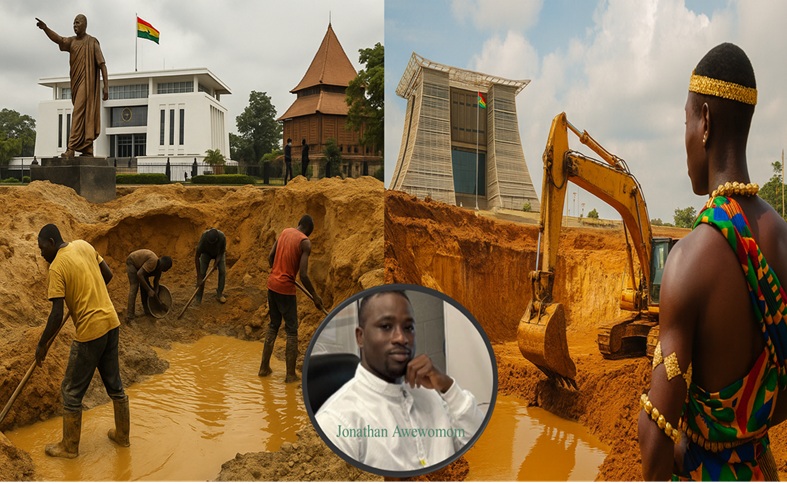
Galamsey in High Places: Who Protects the Pits? Saving Ghana from Itself
Galamsey is often blamed on “illegal miners,” but these poor individuals can barely afford this heavy-duty equipment such as excavators into forest reserves by themselves. They do not smuggle mercury into the country on their own. They do not turn away police patrols, block journalists, or defy court orders unaided. The uncomfortable question we must now ask is this: have the miners captured the state?
The Excavator Mystery: Who Opens the Gates?
Perhaps the biggest question in Ghana’s galamsey puzzle is how these heavy excavators enter the country in the first place. Importing an excavator is no secret transaction — it involves shipping documents, customs clearance, and state oversight. Yet, thousands of these massive machines somehow slip through the system only to end up deep in forest reserves and riverbanks. Even more troubling are reports of “missing excavators” allegedly seized by authorities, with some disappearing right under the nose of state agencies. How does a 20-ton machine vanish into thin air? Who signs the clearance papers, and who looks away at the ports? The rot is not at the pit; it begins at the very gates of power. Until Ghana confronts the institutional complicity that enables this, from import permits to enforcement loopholes, any talk of ending galamsey will remain hollow rhetoric. Accountability must trace the tracks of these machines back to where they were first waved through.
When Enforcement Fails Again and Again
Ghana has launched task forces before; “Operation Vanguard,” “Operation Halt,” and many others. We have burned excavators on live television. We have passed laws increasing penalties. And yet, as soon as the dust settles, the pits reopen, the dredges return to the rivers, and production resumes under the cover of night. This cycle has led many Ghanaians to wonder whether enforcement is genuinely failing or whether it is being allowed to fail.
Allegations of Complicity
Civil society groups, journalists, and even members of parliament have raised alarms about political patrons and financers backing illegal mining operations. Reports of security officers “guarding” illegal sites or tipping off miners ahead of raids have become too frequent to ignore. In some districts, local chiefs and political actors have been accused of taking a share of the proceeds in exchange for silence. If these allegations are true, then galamsey is not simply a law-and-order problem, it is a governance crisis. It means that the very institutions tasked with stopping illegal mining may, in some cases, be sustaining it.
What True Political Will Would Look Like
True political will would mean no sacred cows. It would mean prosecuting not only the miner at the pit but the financier in the boardroom and the official who looked the other way. It would mean tracing the money trail from gold buyers to export permits and shining a light on who profits from this destructive economy. Political will would also mean protecting whistleblowers, resourcing regulators, and publishing the names of offenders. It would mean a level of transparency that reassures citizens that the law applies to everyone no matter their office or party colors.
A Test of National Integrity
This is not about partisan blame. It is about whether the Republic of Ghana can defend its own rivers, forests, and future generations from being sold for short-term profit. If the state cannot stop galamsey, or worse, if elements within the state benefit from it, then our sovereignty is being mined away along with our gold.
A Closing Challenge
The question is simple: are we ready to confront not just the “small boys” with shovels, but the big men behind the concessions, the financiers behind the excavators, and the power brokers behind the impunity? Until we do, we risk proving right those who believe that the state has already been captured; that galamsey is not just a menace in the forest but a presence in the corridors of power.
Ghana must wake up, not just to save its rivers, but to save its republic.
The writer (Jonathan Awewomom) is a GH Research Scientist based in Miami, FLorida-USA and a Contributor to National Discourse.
DISCLAIMER: The Views, Comments, Opinions, Contributions and Statements made by Readers and Contributors on this platform do not necessarily represent the views or policy of Multimedia Group Limited.
DISCLAIMER: The Views, Comments, Opinions, Contributions and Statements made by Readers and Contributors on this platform do not necessarily represent the views or policy of Multimedia Group Limited.
Source: myjoyonline.com










